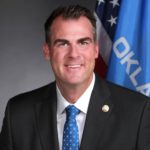 Governor Kevin Stitt is joining 24 governors who are opposing a revised definition of the “Waters of the United States” (WOTUS) rule by the Environmental Protection Agency (EPA). This rule could impact how farmers and ranchers in Oklahoma are allowed to use water on their lands.
Governor Kevin Stitt is joining 24 governors who are opposing a revised definition of the “Waters of the United States” (WOTUS) rule by the Environmental Protection Agency (EPA). This rule could impact how farmers and ranchers in Oklahoma are allowed to use water on their lands.
Stitt and the other governors are asking the Biden Administration to hold off putting the WOTUS rule into place, until a court makes a decision on a related case.
“We request you delay its implementation until the U.S. Supreme Court issues a ruling in Sackett v. EPA. The WOTUS definition has been under scrutiny for nearly twenty years, and your Administration’s rule only further complicates the efforts to create certainty under the CWA for rural communities,” the letter reads in part.
The letter goes on to argue that not only is the regulation overburdensome, but if put into place now could create bigger issues.
“…The rule is problematic in and of itself, but its timing is particularly troubling given record inflation and gas prices that threaten the livelihoods of so many communities. Those who rely on farming and small businesses as a backbone of their local economies are particularly vulnerable. Another burdensome and overbroad regulation from the federal government could not come at a worse time for America.”
You can read the entire letter below.
January 30, 2023
President Joseph R. Biden, Jr.
The White House 1600 Pennsylvania Avenue
Washington, DC 20500
Dear President Biden,
We write in opposition to your rule regarding the Clean Water Act (CWA) and the revised definition of “Waters of the United States” (WOTUS). Specifically, we request you delay its implementation until the U.S. Supreme Court issues a ruling in Sackett v. EPA. The WOTUS definition has been under scrutiny for nearly twenty years, and your Administration’s rule only further complicates the efforts to create certainty under the CWA for rural communities. The problem is exacerbated by the pending Supreme Court ruling. The final WOTUS rule released during the holidays is concerning in terms of timing, substance, and process.
The rule is problematic in and of itself, but its timing is particularly troubling given record inflation and gas prices that threaten the livelihoods of so many communities. Those who rely on farming and small business as a backbone of their local economies are particularly vulnerable. Another burdensome and overbroad regulation from the federal government could not come at a worse time for America. Having already squandered much of America’s energy independence, you should not increase costs for consumers by tying up energy production with even more red tape.
We call into question the timing and necessity of the rule with the Court’s upcoming Sackett decision which is expected by June of this year. That opinion could significantly impact the final rule and its implementation. To change the rule multiple times in six months is an inefficient and wasteful use of State and federal resources and will impose an unnecessary strain on farmers, builders, and every other impacted sector of the American economy.
The substance of the rule hinders State governments as we seek to give clarity and consistency to businesses, farms, and individuals regarding the regulatory framework for water. The broad definitions used in the 514-page document only add to the confusing and complicated history of WOTUS. In fact, it appears that the EPA is seeking to regulate private ponds, ditches, and other small water features.
Understanding the final WOTUS rule will require States and the regulated community to wade through an extensive and unclearly written web of interpretations. Given the many outstanding issues the recent WOTUS rule generates, particularly in rural America, we ask that you delay implementation of the rule until the Court decides Sackett. Small businesses, farmers, and communities across America simply cannot afford another costly revision.
Thank you for your consideration of this request. If you have further questions or would like to learn more from our State agencies, please do not hesitate to reach out to us.
Sincerely,


